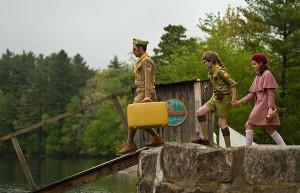
4/5 stars
Wes Anderson is quirky.
With long, wiry hair, a pointed nose, an affinity for tailored corduroy suits and a nervous stutter, he doesn’t seem like a man suited to be the center of attention. Yet this past May, Anderson found himself in the spotlight when Cannes officials selected his seventh feature film, Moonrise Kingdom, to open the prestigious film festival.
The film’s success, both critically and financially, allowed Anderson to reminisce fondly on his whirlwind week at Cannes. A seemingly simple question at the first press screening: Was the movie a memory of a fantasy?
Yes, it certainly was.
In the fourth grade, Anderson fell in love. He still remembers the girl vividly, even her very seat in his class (just three seats up and two rows to his left). They remained classmates for a long time, but he was too afraid to express his feelings. Through the years, his love faded, but his memory of falling in love at a young age did not.
These feelings became Anderson’s inspiration for Moonrise Kingdom.
Set in 1965 on the fictitious New England island of New Penzance, the film details the young love between 12-year-olds Sam Shakusky (Jared Gilman) and Suzy Bishop (Kara Hayward). After meeting mysteriously at a church performance of Benjamin Britten’s “Noye’s Fludde,” the two exchange letters for a year and eventually decide to run away together.
As with any fantasy, though, there are complications. Sam must escape from his ‘Khaki Scout’ summer camp, led by Scout Master Ward (Edward Norton), while Suzy must elude her parents, attorneys Walt (Bill Murray) and Laura Bishop (Frances McDormand).
Once reunited, the runaways continue to face growing pressure from the outside world. The island’s lone police officer, Captain Sharp (Bruce Willis), coordinates an island-wide search party, Sam’s hostile Khaki Scout-mates scour the island for traces and authorities alert a Social Services officer (Tilda Swinton) to deal with Sam, who we learn is an orphan.
The intrusion of nature acts as a backdrop to this community turmoil. The narrator (Bob Balaban) tells us of the imminent arrival of a massive and historic storm that will batter the island in three days’ time. These swirling tensions hover around the young couple, making for a compelling love story and a great film.
But those unfamiliar with Anderson’s work may take a little while to adjust. His films are short — only about 90 minutes, on average — and feature a blend of witty dialogue and deadpan humor. He’s a huge fan of bright colors and devotedly sticks to a unique color scheme throughout each film — forMoonrise, the pallet is a late summer-autumnal blend of golden yellow, olive green, robin’s egg blue and burnt orange. He heavily utilizes long tracking sequences, as evidenced by the film’s opening shot, which intricately takes us through the walls of the bustling Bishop household as if it had been cut down the middle. Anderson indeed constructed the ‘sliced house’ inside a defunct Linens ’n’ Things in Newport, R.I. He favors bold graphics, replacing consumer logos for post offices, coffee shops and food products with stark, eye-catching, self-made designs. He also selects unique but fitting soundtracks — for Moonrise, a combination of Benjamin Britten’s booming orchestra and Hank Williams’ somber crooning — that deftly capture the mood and linger in your mind for days.
In Moonrise, Anderson remains faithful not only to his style but also to his recurring themes. Broken households, taboo love, forgotten dreams and gradually evolving self-awareness are all present.
Sam and Suzy’s love is the film’s focus, but Anderson also keys in on Walt and Laura’s crumbling marriage, Laura’s affair with an unfulfilled and lonely Captain Sharp, Scout Master Ward’s feelings of inadequacy and the often brutal idiosyncrasies of childhood.
While some may see Anderson’s latest as repetitive and unoriginal, it may be his most emotional film yet. Like the Bishops, Anderson’s parents suffered a declining relationship that ended in divorce when he was 13. Like Suzy, as a child Anderson found a pamphlet for dealing with troubled youth on his mother’s nightstand.
Moonrise Kingdom is certainly a fantasy, but it is also heavily grounded in reality.
With a budget of $16 million, the small film is no summer blockbuster. It comes without a multimillion-dollar advertising campaign, without fast-paced action shots, without 3-D features and without much fanfare.
What it does come with, though, is great directing, strong acting and a unique story that simply feels right for summer. Bringing fun and a sense of escape to true love, summer is a tease that comes around for only a few months each year. It ushers in the fantasy of new experiences and sensations but inevitably retreats each fall as we return to reality. Within the fantasy of Moonrise Kingdom, Anderson expertly weaves these summer feelings within all of us: feelings of love, of loss and of excitement that emerge for a just short window each year.








